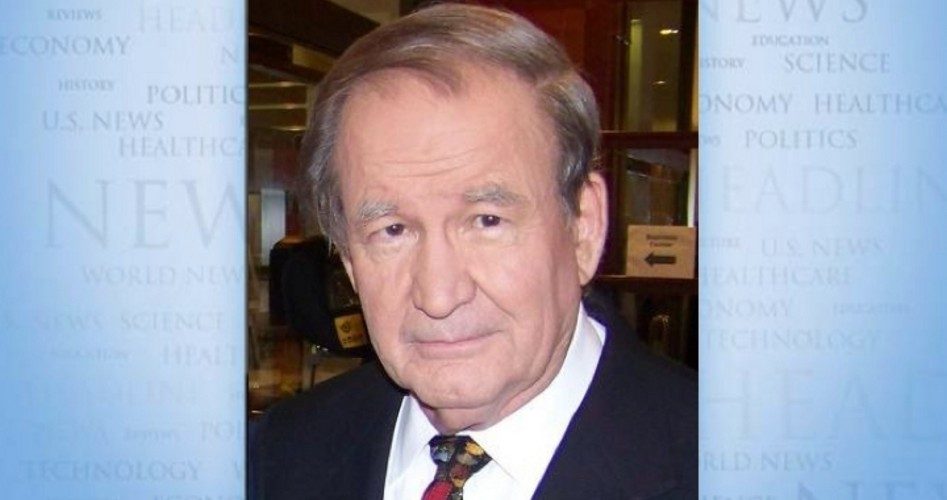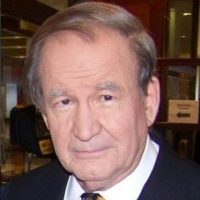
For a president who won his office by denouncing the Middle East wars into which George W. Bush and Barack Obama plunged the nation, Donald Trump has assembled the most unabashedly hawkish conclave of foreign policy advisers in memory. And he himself seems to concede the point.
If foreign policy were decided by my security adviser John Bolton, the president confided recently, “We’d be in four wars by now.”
It was Bolton who ordered the Abraham Lincoln carrier group and B-52s to the Gulf and told the Pentagon to draw up plans to send 120,000 U.S. troops. It is Bolton who is charging Iran with using mines to sabotage four oil tankers outside the Strait of Hormuz.
Asked for evidence, Bolt barked back at reporters: “Who else would you think is doing it? Somebody from Nepal?”
But if Bolton is first hawk, he is not without rivals in the inner circle of the Commander in Chief.
At West Point last week, Vice President Mike Pence, after hailing the diversity of a class with the highest number of Hispanic and black women graduates ever, laid out what the future holds in store for them.
“You will fight on a battlefield for America … You will lead soldiers in combat. It will happen.
“Some of you will join the fight against radical Islamic terrorists in Afghanistan and Iraq. Some of you will join the fight on the Korean Peninsula and in the Indo-Pacific, where North Korea continues to threaten the peace, and an increasingly militarized China challenges our presence.
“Some of you will join the fight in Europe, where an aggressive Russia seeks to redraw international boundaries by force. And some of you may even be called upon to serve in this hemisphere.
“And when that day comes, I know you will move to the sound of the guns … and you will fight, and you will win.
“Put your armor on,” Pence admonished the warriors, “so that when — not if — that day comes, you’ll be able to stand your ground.”
A question: Did not candidate Trump say he would be ending wars and bringing troops home, not plunging into new conflicts in the Mideast, Asia, Europe, the Western Hemisphere and “the Indo-Pacific”?
As for war in our hemisphere, which Pence said was possible, that could come sooner than the graduating cadets expect, if Trump’s confidant Sen. Lindsey Graham has his way.
All last week, Graham beat the drums for an ultimatum to Cuba to get any and all of its troops out of Venezuela. Should Havana refuse, said Graham, Trump ought to “do in Venezuela what Reagan did in Grenada.”
In 1983, Reagan ordered an invasion of Grenada to prevent U.S. medical students from being taken hostage by Marxist thugs who had just assassinated their leader and seized power.
But Grenada is a tiny island roughly twice the size of Washington, D.C., with a population of 100,000, while Venezuela is the size of Texas, with 30 million people and an army of more soldiers than Grenada has citizens.
“I would let the Venezuelan military know, you’ve got to choose between democracy and Maduro,” thundered Graham. “And if you choose Maduro and Cuba, we’re coming after you. This is our backyard.”
Trump may have run as anti-interventionist, but his secretary of state was apparently not closely following his campaign.
Speaking at the West Coast neocon lamasery Claremont Institute last week, Secretary Mike Pompeo said the Founding Fathers “knew peace wasn’t the norm” and “conflict is the normative experience for nations.”
He ripped into the Russians.
Thirty years after the Cold War, said Pompeo, “The Putin regime slays dissidents in cold blood and invades its neighbors,” and, along with China, conducts a foreign policy “intent on eroding American power.”
“We Americans have had too little courage to confront regimes squarely opposed to our interests and our values.”
As for “America First!” Pompeo explained Trump’s signature phrase thus:
The president “believes America is exceptional — a place and history apart from normal human experience.” This recalls Madeline Albright’s famous formulation: “We are the indispensable nation. We stand tall and we see further … into the future.”
President George Washington would approve of our policies, said Pompeo. Though the Father of our Country may have warned in his Farewell Address against “permanent alliances,” we are “banding together with the like-minded nations like Australia, India, Japan and South Korea to make sure that each Indo-Pacific nation can protect its sovereignty from coercion.”
“American exceptionalism … will remain alive and well in the 21st century,” concluded Pompeo. “What’s good for the United States is good for the world.”
One wonders: Do the hawks in his inner councils speak for Trump? For they surely do not speak for a nation whose weariness with wars put him into the White House.
On the first day of Trump’s visit to London, Pompeo, who last year issued his 12 demands on Iran, was quoted as saying the U.S. is now prepared to negotiate with Tehran with “no preconditions.”
For now, Trump’s hawks appeared contained. But for how long?
Photo of Patrick J. Buchanan: Bbsrock — Own work, CC BY-SA 3.0
Patrick J. Buchanan is the author of Nixon’s White House Wars: The Battles That Made and Broke a President and Divided America Forever. To find out more about Patrick Buchanan and read features by other Creators writers and cartoonists, visit the Creators website at www.creators.com.
COPYRIGHT 2019 CREATORS.COM



